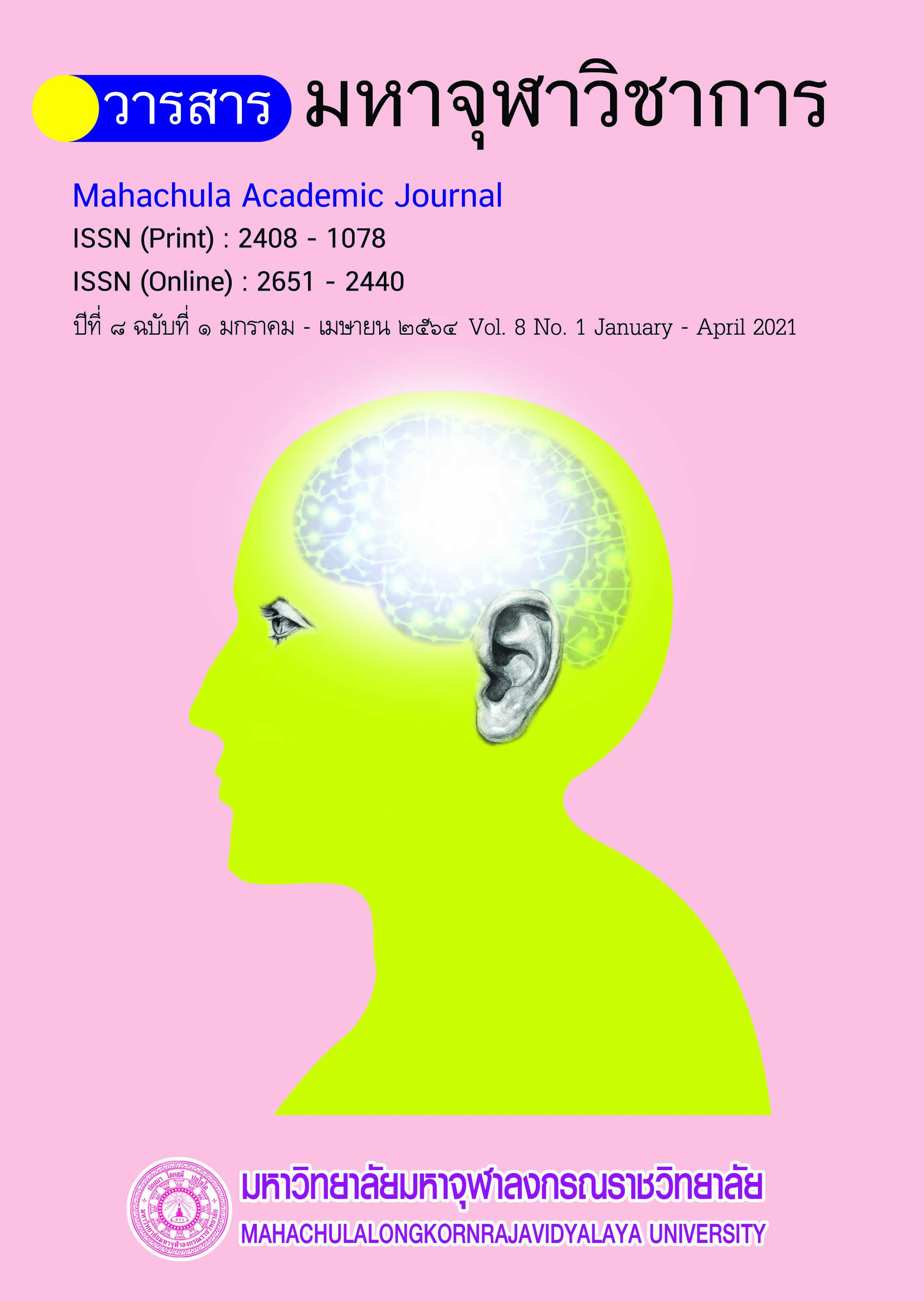Supporting Volunteer Spirit in According To Bodhisatta
Main Article Content
Abstract
The objectives of this thesis were as follows (1) to study the promotion of volunteer spirit (2) to study the promotion of the volunteer spirit according to Bodhisattva Principles, and (3) to analyze the value of the promotion of the volunteer spirit according to Bodhisattva Principles. The thesis was the documentary qualitative research works focused on documentaries, studies mainly on the Tipitaka, relating documentaries and relevant researches together with the interviews of the related persons. All of the data, collected during April 2019 - March 2020, were then analyzed by content analysis and analytic induction, classified into system, concluded and presented in descriptive analysis.
The results of research were found as follows:- (1) The promotion of volunteer spirit was the creation of the human consciousness based on real feelings into the mind of the sacrifice for helping the others and society to be happy with voluntary, rapture, impressiveness, joy, valuable and the development of mind to be higher. (2) The voluntariness according to Bodhisattva Principles was the desire to help the others from suffering or problems together with public services from the sacrifice of a pure mind and voluntary without return according to Buddhist Doctrine including Poratokosa (hearing or learning from others), Yoniso Manasikara (systematic attention), Dhramma Sharing and Kindly Speech. (3) The analytical results for the value of the promotion of the volunteer spirit according to Bodhisattva Principles were as follows: 1) the value of self development aspect including the development of body, mind and wisdom, 2) the value of the social development aspect regarding the personal mind upgrading with loving kindness for social giving more than receiving to be the qualify society for everyone and 3) the value of the achieve attainment
aspect as a volunteer spirit for helping the others from various kinds of suffering.
Article Details
References
กรรยา พรรณา. จิตสาธารณะสร้างได้ง่ายนิดเดียว. กรุงเทพมหานคร : สำนักพิมพ์แห่งจุฬาลงกรณ์ มหาวิทยาลัย, ๒๕๕๙.
ดนสวัสดิ์ ชาติเมธี. “ศึกษาวิเคราะห์หลักภาวะผู้นำของพระโพธิสัตว์ที่ปรากฏในอรรถกถาชาดก”. วิทยานิพนธ์ พุทธศาสตรดุษฏีบัณฑิต. บัณฑิตวิทยาลัย: มหาวิทยาลัยมหามกุฏราชวิทยาลัย, ๒๕๕๗.
พรรณภัสส์ ภูแผ่นนา. “ปัจจัยที่ก่อให้เกิดจิตอาสาของอาสาสมัคร ในโครงการอาสาสมัครดูแลผู้สูงอายุที่บ้านอาเซียนโฮมแคร์ จังหวัดเชียงใหม่”. วิทยานิพนธ์ศาสนศาสตรมหาบัณฑิต. บัณฑิตวิทยาลัย:มหาวิทยาลัยมหามกุฏราชวิทยาลัย, ๒๕๕๔.
พระพรหมคุณาภรณ์ (ป.อ. ปยุตฺโต). ธรรมนูญชีวิต. กรุงเทพมหานคร: สหธรรมิก จำกัด. ๒๕๔๗.
พระไพศาล วิสาโล. พระธรรมปิฏกกับอนาคตของพุทธศาสนา. กรุงเทพมหานคร : ธรรมสาร, ๒๕๔๒.
พระมหาสมยศ อภายุตฺโต (เสนานุช). “ศึกษาเชิงวิเคราะห์แนวความคิดเรื่องพระอวโลกิเตศวรโพธิสัตว์(กวนอิม) ในพระพุทธศาสนามหายาน”. วิทยานิพนธ์พุทธศาสตรมหาบัณฑิต. บัณฑิตวิทยาลัย: มหาวิทยาลัยมหาจุฬาลงกรณราชวิทยาลัย, ๒๕๔๖.
วราพร วันไชยธนวงศ์ และคณะ. “กระบวนการสร้างจิตอาสาของนักศึกษาพยาบาลบรมราชชนนี เชียงใหม่”. รายงานการวิจัย. เชียงใหม่: วิทยาลัยพยาบาลบรมราชชนนี, ๒๕๕๐.
สรณีย์ สายศร. “การบูรณาการหลักการทางพระพุทธศาสนาในการทำงานจิตอาสา”. วิทยานิพนธ์พุทธศาสตรมหาบัณฑิต. บัณฑิตวิทยาลัย: มหาจุฬาลงกรณราชวิทยาลัย, ๒๕๕๗.
สุธาทิพย์ แก้วเกลี้ยง. “การพัฒนาจิตอาสาในพระพุทธศาสนา”. วิทยานิพนธ์ศิลปศาสตรบัณฑิต. บัณฑิตวิทยาลัย: มหาวิทยาลัยมหิดล, ๒๕๔๙.


